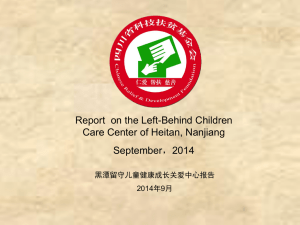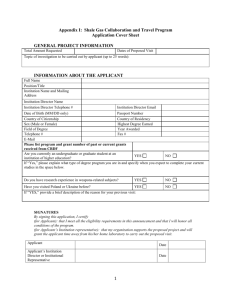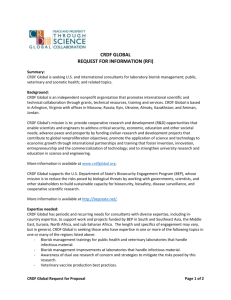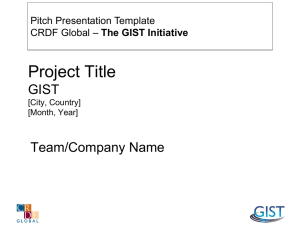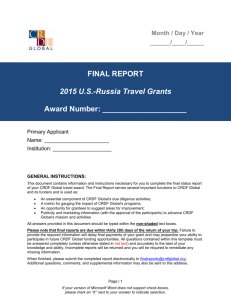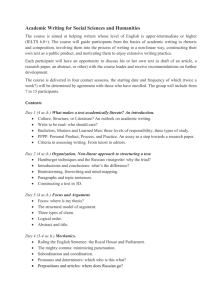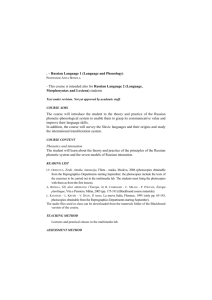UrB RAS Special Requirements
advertisement
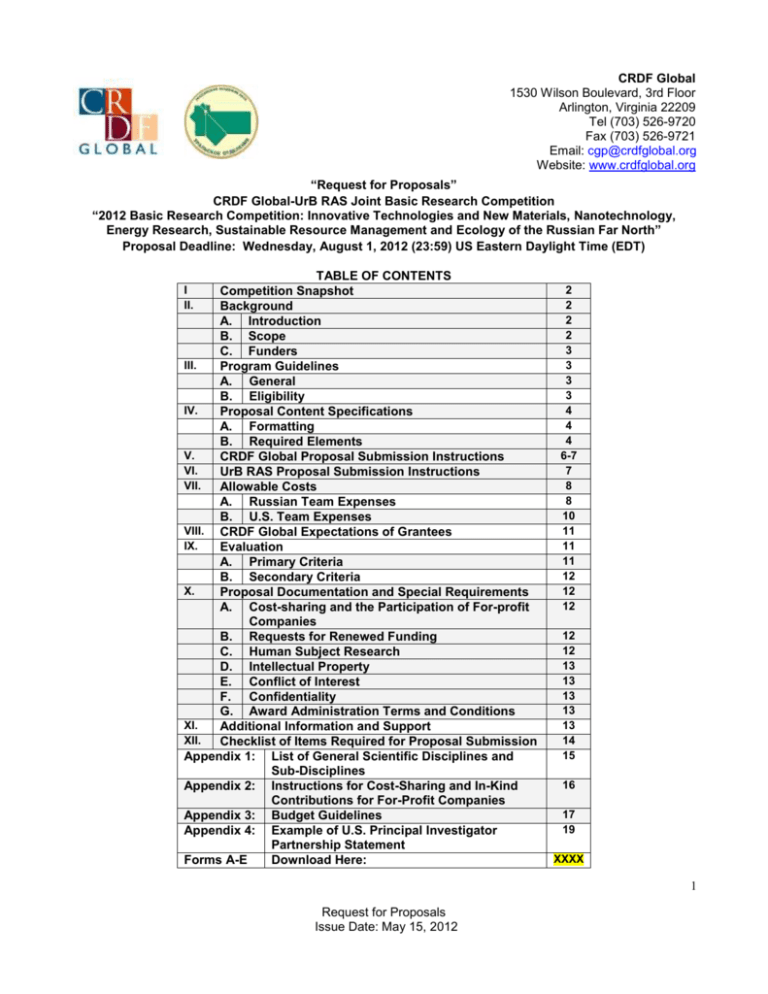
CRDF Global 1530 Wilson Boulevard, 3rd Floor Arlington, Virginia 22209 Tel (703) 526-9720 Fax (703) 526-9721 Email: cgp@crdfglobal.org Website: www.crdfglobal.org “Request for Proposals” CRDF Global-UrB RAS Joint Basic Research Competition “2012 Basic Research Competition: Innovative Technologies and New Materials, Nanotechnology, Energy Research, Sustainable Resource Management and Ecology of the Russian Far North” Proposal Deadline: Wednesday, August 1, 2012 (23:59) US Eastern Daylight Time (EDT) TABLE OF CONTENTS Competition Snapshot Background A. Introduction B. Scope C. Funders III. Program Guidelines A. General B. Eligibility IV. Proposal Content Specifications A. Formatting B. Required Elements V. CRDF Global Proposal Submission Instructions VI. UrB RAS Proposal Submission Instructions VII. Allowable Costs A. Russian Team Expenses B. U.S. Team Expenses VIII. CRDF Global Expectations of Grantees IX. Evaluation A. Primary Criteria B. Secondary Criteria X. Proposal Documentation and Special Requirements A. Cost-sharing and the Participation of For-profit Companies B. Requests for Renewed Funding C. Human Subject Research D. Intellectual Property E. Conflict of Interest F. Confidentiality G. Award Administration Terms and Conditions XI. Additional Information and Support XII. Checklist of Items Required for Proposal Submission Appendix 1: List of General Scientific Disciplines and Sub-Disciplines Appendix 2: Instructions for Cost-Sharing and In-Kind Contributions for For-Profit Companies Appendix 3: Budget Guidelines Appendix 4: Example of U.S. Principal Investigator Partnership Statement Forms A-E Download Here: I II. 2 2 2 2 3 3 3 3 4 4 4 6-7 7 8 8 10 11 11 11 12 12 12 12 12 13 13 13 13 13 14 15 16 17 19 XXXX 1 Request for Proposals Issue Date: May 15, 2012 I. COMPETITION SNAPSHOT Competition Opens Tuesday, May 15, 2012 Competition Deadline Wednesday, August 1, 2012 (23:59 US Eastern Standard Time EST). How to Apply https://proposals.crdfglobal.org/URBRAS2012 General Research Area(s) Nanotechnology, Energy Research, Sustainable Resource Management, Ecology of the Russian Far North Basic Eligibility Proposals must include one Russian Principal Investigator and one U.S. Principal Investigator, each possessing the degree of Ph.D., M.D., or the equivalent research experience. Award Amounts Up to 5 of awards, each up to $48,000 Complete Competition Announcement http://www.crdfglobal.org/about-us/funding http://www.uran.ru II. Background A. CRDF Global and UrB-RAS are accepting proposals from joint teams of U.S. and Russian researchers for the 2012 CRDF Global-UrB RAS Joint Basic Research Competition (see Section V. (p.6-7) for CRDF Global submission instructions, Section VI, (p.7-8) for UrB-RAS submission instructions). This competition is co-sponsored by CRDF Global and UrB-RAS with funding provided by the U.S. Department of State, the U.S. National Science Foundation, and UrB RAS. This competition is open only to applicants from the scientific centers and institutes of the Ural Branch of the Russian Academy of Sciences. Awards made through this competition will provide a maximum of 5 of awards, each up to $48,000 USD over two years to joint research teams of U.S. and Russian scientists. The deadline for proposals is Wednesday, August 1, 2012 (23:59 U.S. Eastern Daylight Time EDT) B. The primary goals of the Competition are to: Support high-quality basic research in the Ural region of the Russian Federation in the above specified areas Establish sustainable joint U.S. - Russia research collaborations CRDF Global and UrB RAS will only accept proposals in the following areas of basic research: Scientific basis for development of innovative technologies and new materials. Nanomaterials and Nanotechnology. Improving systems for the production, transfer, and use of energy that encourages energy efficiency. Sustainable natural resource management and the development and use of raw materials. Russian Far North ecosystems: their impact on human health; effective monitoring methods used to forecast transformations. Multidisciplinary proposals are particularly encouraged. 2 Request for Proposals Issue Date: May 15, 2012 All proposals must be submitted electronically through CRDF Global’s Electronic Proposal Submission (EPS) site: https://proposals.crdfglobal.org/URBRAS2012. C. Funders CRDF Global is a nonprofit independent organization authorized by the U.S. Congress and established in 1995 by the National Science Foundation. This unique organization promotes international scientific and technical collaboration through grants, technical resources, and training. CRDF Global receives funding for this program from the U.S. Department of State and the U.S. National Science Foundation (NSF). More information about CRDF Global can be found at http://www.crdfglobal.org. UrB RAS is a regional branch of the Russian Academy of Sciences (independent nonprofit scientific organization, created as a State Academy of sciences). UrB RAS includes 40 scientific organizations located in seven regions of the Russian Federation from European North to Southern Ural. UrB RAS was founded in 1932 with the goal to accelerate the social and economic development of the Ural region of Russia. More information about UrB RAS can be found at http://www.uran.ru. III. Program Guidelines A. General. The total maximum grant amount is $48,000: $31,000 U.S. Dollars (USD) from CRDF Global and the equivalent of $17,000 U.S. Dollars (USD) in the national currency of Russia, from UrB RAS (Total of $48,000 USD for both teams). No more than $33,000 of the funds awarded to each project must be used for the Russian team’s expenses, including institutional support. No more than $15,000 may be used for the U.S. team’s expenses. These funds will be allocated separately and administered directly to the individuals and institutions involved. Proposals Submitted On or Before: Announcement of Results: Wednesday, August 1, 2012 23:59 Eastern Daylight Time Wednesday, October 31, 2012 via email All proposals must be submitted electronically through the CRDF Global Electronic Proposal Submission (EPS) site (See Section V. “CRDF Global Proposal Submission Instructions” (p.6-7)). B. Eligibility Each proposal must meet each of the following eligibility criteria: 1. Each proposal submitted must have one Russian Principal Investigator and one U.S. Principal Investigator, who share overall responsibility for the project in their respective countries, coordinating all project participants and institutions. 2. Each Principal Investigator must: a. Possess the degree of Ph.D., M.D., or the equivalent research experience; b. Have at least five (5) scientific publications in peer-reviewed scientific literature (if the applicant has received his or her academic degree in the past six (6) years, three (3) publications are required), and c. Work full-time in a civilian research environment1 1 U.S. Government Laboratory employees working on civilian-oriented research and development projects are eligible to apply to this program. 3 Request for Proposals Issue Date: May 15, 2012 3. The Russian Principal Investigator must be a citizen and permanent resident of the Russian Federation. All Russian participants must reside in the Russian Federation for the majority of the grant period. 4. The U.S. Principal Investigator and participants on the U.S. team must be legally employed by a U.S. institution and must reside in the U.S. during the course of the CRDF Global project. Graduate students on the U.S. team may be foreign nationals, but they must be enrolled full-time in an accredited degree program at the U.S. institution. 5. All projects must be oriented toward non-military objectives and must be carried out in a civilian research environment. 6. Each proposal is evaluated independently and therefore should not be part of, nor depend on the success of other proposals submitted to this program. 7. Principal Investigators who have a previous or current CRDF Global award, that are within six (6) months of completion as of the submission deadline, are eligible to apply to this program. Applicants who are previous or current CRDF Global grantees must be up to date on the submission of all progress reports, including final project reports. Please refer to Section X.B. “Requests for Renewed Funding” (p. 12). 8. CRDF Global reserves the right to restrict the participation of any individual or institution in its programs. CRDF Global complies with all U.S. laws and regulations pertaining to export control and the participation of foreign nationals or institutions in its activities. It is the policy of CRDF Global not to conduct any transactions with U.S. restricted entities without appropriate authorization from the U.S. Government. CRDF Global strongly encourages applicants to contact a Program Manager at cgp@crdfglobal.org if they are unsure whether their research topic is eligible for this competition. IV. Proposal Content Specifications We highly encourage all applicants to review our Frequently Asked Questions and Grant Writing Tips before writing their application at http://www.crdfglobal.org/focus-areas/research-partnerships/applicantresources. These resources include sample forms and examples on how to avoid common mistakes in proposal preparation. Only proposals which follow the below formatting and include all of the required elements listed below in sections A and B will be reviewed. A. Formatting: Typed In English Singlespaced One-inch margins on ALL sides Pages numbered consecutively in the upper right corner Font size of no less than Arial 10pt (Times New Roman 10pt font is not acceptable) B. Required Elements (Prior to submission, please refer to the Checklist of Documents Required for Proposal Submission located in Section XII (p. 14).) 1. Applicants are required to use the electronic templates for Forms A-E (downloadable as a Word Document here: XXXXX). 2. Cover Sheet (Form A). The cover sheet includes basic information about the proposal, Russian Principal Investigator, Russian Institution Director, the U.S. Principal Investigator, and the U.S. 4 Request for Proposals Issue Date: May 15, 2012 Institutional Representative. The U.S. Institutional Representative is the individual who would be responsible for negotiating contractual and financial terms in the case of award. This information must also be entered during the electronic proposal submission process. IMPORTANT: CRDF Global requires that Form A be signed by both the Russian Principal Investigator and Russian Institute Director. 3. Abstract In one concise paragraph, summarize all relevant aspects of the project, with special attention to its objectives, methods, and potential results. 4. Project Narrative (8 pages maximum, including any graphs, diagrams, photos, and references cited). Describe: a. The approach, objectives, milestones, and measurements of success that will be used; b. A clearly defined project timeline, noting all project tasks and goals to be accomplished on a quarterly basis; c. How the individual and combined competencies of the Russian and U.S. research teams will enable the project to be carried out, and what relevant prior work has been carried out by members of the team. Prior CRDF Global awards must also be described: see Section X.B. “Requests for Renewed Funding” (p. 12) below; d. The anticipated results of the project and how they address the CRDF Global evaluation criteria listed in Sections VIII-IX (p. 11) below; e. How the project compares to current research conducted in the topic area; f. Equipment to be utilized in the project, with special focus on justifying requests for any equipment for which CRDF Global support is requested; g. How the Russian and U.S. Principal Investigators will coordinate project implementation and assess progress at regular intervals. Each project must involve significant and substantive cooperation between the Russian and U.S. teams. All proposed international travel to be funded under the project must be described in terms of its purpose and duration. 5. Russian and U.S. Principal Investigator Curricula Vitae. The proposal must contain a Curriculum Vitae (CV) for each Principal Investigator. It should include the individual’s name, title, educational background, current and previous institutional affiliations with dates, area of expertise, and his or her scientific publications of relevance to the project. Each Principal Investigator must list at least five (5) publications of relevance (if the PI has received his or her Ph.D. in the past six (6) years, three (3) publications are required). 6. Russian and U.S. Personnel Data (Form B). Please fill this form out for each participant on the Russian and U.S. team, including researchers/engineers, technical/scientific support staff, graduate and undergraduate students, administrative/clerical support staff, and secondary collaborators. IMPORTANT: a. Form B should not exceed half a page; two forms should be combined on a single page. b. U.S. personnel are not required to offer information regarding their dates of birth. Form B is for additional team personnel only; the Russian and U.S. Principal Investigators (PI) do not need to complete Form B with their own information. 5 Request for Proposals Issue Date: May 15, 2012 7. Russian & US Personnel Curricula Vitae. In addition to Form B, the proposal must contain a detailed Curriculum Vitae for each project participant. It should include the individual’s name, title, educational background, current and previous institutional affiliations with dates, area of expertise, and a list of his or her scientific publications. 8. Budget (Form C). A complete budget must be submitted using the Form C template. Applicants should submit one budget (Form C) for the entire award period. Applicants should refer to the “Budget Guidelines” in Appendix 3 (p.17) for information to be listed in the budget. Note on Cost-Sharing and In-Kind Contributions: Under this competition, CRDF Global requires cost-sharing from for-profit companies applying to the program. U.S. and Russian for-profit companies are allowed to participate in this competition as long as they provide a cost-share for the projects. a. U.S. for-profit companies may not request any funding from CRDF Global and must provide a cash, material, or in-kind contribution by the U.S. for-profit company of 10% of the expenses of the Russian team b. Russian for-profit companies must provide up to 5-10% of the total Russian expenses by committing cash, material or in-kind contributions. CRDF Global will accept in-kind contributions such as equipment usage costs, personnel salary compensation, travel support, institutional or overhead support, in addition to other covered expenses. Please see Appendix 2 (p. 16) for additional information on cost-sharing requirements for for-profit companies. 9. Budget Narrative. A separate sheet explaining all budget items in detail must follow the Budget (Form C). This sheet should be clearly marked “Budget Narrative.” Applicants should refer to the “Allowable Costs” in Section VII. (p. 8-10) and the “Budget Guidelines” in Appendix 3 (p.17) for information that should be described in detail in the Budget Narrative. Requested equipment items with a value of over $1,000 must be explained in the Budget Narrative. 10. Statement of Other Support (Form D). Both Principal Investigators must complete the Statement of Other Support (Form D), listing current and pending sources of support for all their research projects, excluding those that are already included under the “COST-SHARING FROM NON-CRDF SOURCES” section in the Budget (Form C). Applicants with grants from U.S. Government sources, such as NIH or NSF, should indicate the grant number, duration of the award, and level of effort. If a Principal Investigator has no other sources of support, please check the box marked “None” at the top of Form D, and include this page with the proposal. If this proposal has also been submitted to another organization, please indicate this information clearly in Form D. 11. Previous CRDF Global Awards (Form E) – if applicable. Both Principal Investigators must complete Form E for each previously held CRDF Global award, if it is directly related to the research objectives outlined in the current proposal. Individual forms should not exceed one page. 12. U.S. Principal Investigator Partnership Statement. The U.S. Principal Investigator must provide a signed statement on organizational letterhead certifying his or her agreement to the collaboration. A scanned copy of this agreement must be included in the proposal when it is submitted to CRDF Global. An example of a Partnership Statement can be found in Appendix 4 (p.19). You will be requested to upload it as a separate document during the electronic proposal submission process. V. CRDF Global Proposal Submission Instructions All proposals must be submitted electronically through CRDF Global’s Electronic Proposal Submission (EPS) site, which will go live no later than Wednesday, August 1, 2012: https://proposals.crdfglobal.org/URBRAS2012 6 Request for Proposals Issue Date: May 15, 2012 ***Please note: Submission through this website does not require previous registration. Proposals should be submitted only ONE time and by only ONE Principal Investigator on the project. The Russian and U.S. Principal Investigators should jointly develop the proposal and obtain the concurrence of the Russian Institute Director and U.S. Institutional Representative. Once the proposal has been finalized, they should select one Principal Investigator to submit the proposal electronically through the CRDF Global website. At the conclusion of the electronic submission process, both the Russian and U.S. Principal Investigator will receive a confirmation message from CRDF Global. A copy of this message will also be sent to the Russian Institute Director and the U.S. Institution Representative identified in the proposal. Further instructions on electronic proposal submission are available at the above website. VI. UrB RAS Submission Requirements In addition to submitting an electronic version of the proposal in English to the CRDF Global website, applicants must submit an electronic version of the proposal in Russian to the UrB RAS by e-mail at rntc@yandex.ru and a hard copy of the proposal to the Regional Science and Technology Center (RSTC) via regular mail at: 91 Pervomaiskaya Street, room 105, Ekaterinburg, Russia 620990. Proposal copies may also be delivered directly to the RSTC, postmarked by the online submission deadline. Proposal envelope should carry the title of the competition division, the full name of the Principal Investigator and the proposal title. The author of the proposal will receive a notification from RSTC. If the notification is not received, the applicant should contact the UrB Competition commission at mushnikov@prm.uran.ru and rntc@yandex.ru. Proposal hardcopy must begin with a Cover Sheet (Form A) (download here: XXXX) that includes the signatures of the Russian Principal Investigator and the Russian Institute Director. Russian Principal Investigators must also submit documentation to the CRDF Global Office in Russia. Russian Principal Investigators should complete the CRDF Global-UrB RAS Proposal Overview Form (download here: XXXX) and mail this form and a Cover Sheet (Form A) to the CRDF Global Moscow office at: Moscow, 117997, Russia, Ulitsa Miklukho-Maklaya 16/10 Room 206, postmarked by August 1, 2012. A Cover Sheet (Form A) must include the signatures of the Russian Principal Investigator and the Russian Institute Director. In addition, the Proposal Overview Form and a Cover Sheet (Form A) must be scanned and emailed to CGP project coordinator in Moscow Marina Yundina at yundina@crdf.ru. Summary Table of Special Requirements for Applicants from Russia Principal Investigator Country Russia Requirements A hard copy of proposal in Russian language Specifications Must be sent via regular mail, postmarked by the online submission deadline, or delivered directly to the RSTC. Proposal envelope should carry the title of the competition division, the full name of the Principal Investigator and the proposal title. Submission Recipient The Regional Science and Technology Center (RSTC) 7 Request for Proposals Issue Date: May 15, 2012 2012 CRDF Global-UrB RAS Joint Basic Research Competition Proposal Overview Form and a Cover Sheet (Form A) 1) Proposal Overview Form must be completed in Russian language and include Russian Principal Investigator name and institute, Russian Institute Director name, Project Abstract (Section IV.p.5), and a signature of the Russian Principal Investigator. CRDF Global Moscow Office 2) Cover Sheet (Form A) must include the signatures of the Russian Principal Investigator and the Russian Institute Director Hard copies of the Proposal Overview Form and a Cover Sheet (Form A) must be submitted via regular mail and scanned copies must be emailed to Marina Yundina at yundina@crdf.ru. VII. Allowable Costs No proposal requesting more than $31,000 USD from CRDF Global and the equivalent of $17,000 USD in Russian currency from UrB RAS will be considered by CRDF Global (a combined total of $ 48,000 approximately). In case of an award, the project budget may be subject to revision by CRDF Global staff. The following costs are permitted under CRDF Global guidelines for this program: A. Russian Team Expenses Support for the Russian team’s expenses must not exceed $33, 000. No Russian taxes may be included in any budget proposal submitted to CRDF Global. *Note on Funding allocation: Funds received from UrB RAS (the equivalent of up to $17,000 USD) may ONLY be used for the Russian team members’ individual financial support.* Allowable expenses include: 1. Individual Financial Support. Individual Financial Support (IFS) is defined as payments made to individual project participants for work performed on the project (i.e., labor costs). CRDF Global calculates individual financial support based on the level of effort and the professional level of each participant. A month for full-time personnel is considered 20 days, with each day made up of 8 hours of work. The IFS requested in the budget shall be an estimate of the direct level of effort each individual will devote to the project. Actual individual financial support requests for payment will be based on level of effort recorded during a reporting period but may not exceed the monthly maxima for the positions listed below or total budgeted IFS for the award. The level of effort projected for the Principal Investigator/Project Director and Researchers/Engineers may not exceed 75 percent of full time over the course of an award. Therefore, for a 2 year award, the budget may not include more than 360 days or 2880 hours of IFS projected for these positions. 8 Request for Proposals Issue Date: May 15, 2012 The range of allowable IFS hourly rates for a number of professional levels is shown below. Please consider these rates, as well as geographical, cost-of-living, and other factors, when calculating individual financial support for project personnel. Range of Minimum and Maximum IFS Hourly Rates Maximum Amount Per Person Per Month Principal Investigator / Project Director $5.00 to $7.50 $1200 Researcher/Engineer $4.54 to $6.82 $1091 Graduate Student $2.84 to $4.26 $682 Technical/Scientific Support Staff $1.75 to $2.50 $400 Administrative/Clerical Support Staff $1.75 to $2.00 $320 Position 2. Equipment, Supplies and Services. This includes support for research equipment, including computers and telecommunications devices and/or services, subscriptions to scientific journals, reagents, and other materials to be used in the research. Any requested item of equipment valued at more than $1,000 must be specifically described and justified in the Budget Narrative. If the proposal is to include services of professional consultants or service providers such as legal counsel, patent consultants, or other services, these services must be detailed in the Budget Narrative with a justification as to their necessity for successful execution of the project. 3. Travel. Transportation and per diem support for travel of Russian personnel in connection with the project should be requested and described in the Budget Narrative. International travel to collaborating labs is strongly encouraged. Travel funds may also be used for domestic travel within the Russian Federation. Limited support is also available for travel to international scientific meetings. The following cost guidelines should be used in preparing the travel portion of the budget: a. International Transportation. CRDF Global -supported travelers must purchase the lowest-cost applicable round-trip airfare from Russia. Travelers must comply with the provisions of the Fly America Act. For more information, please see: http://www.crdfglobal.org/focus-areas/research-partnerships/applicant-resources. b. Travel Allowances. Applicants should refer to CRDF Global International Travel Allowances when preparing their travel budget. For travel to the United States, visit: http://www.gsa.gov/portal/category/21287. 9 Request for Proposals Issue Date: May 15, 2012 c. For other international travel, refer to http://aoprals.state.gov/content.asp?content_id=184&menu_id=78. These allowances cover lodging, meals, and incidental expenses. Health insurance is mandatory for all travel under CRDF Global awards and should be included in the proposal budget in addition to the travel allowance. Visa fees are allowable expenses and may be included in the proposal budget. The maximum time abroad for any one CRDF Global -supported traveler is eight months over the course of an award. No single visit may exceed four months. It is also important to provide a justification and a description of the travel plans within the Budget Narrative. 4. Secondary Collaborators. Secondary collaborators are institutions other than the Russian or U.S. Principal Institutions that will participate in the proposed project and receive support under a CRDF Global award. Secondary collaborators may participate in the form of sub-contracted work and may include any allowable costs described in this section. All secondary collaborator personnel and facilities must be specifically listed and described in the proposal. A separate budget justification for each secondary collaborator must be included in the Budget Narrative. Secondary collaborators must be citizens and current residents of the Russian Federation. 5. Institutional Support. Russian grantees must include in their budgets an allowance for institutional costs of 10% of the total Russian team expenses. 6. Administrative Superiors. An "Administrative Superior" is defined as an individual who has direct administrative authority over the Project Director/Principal Investigator, and who works within the same division, laboratory, or unit as the Project Director/Principal Investigator. CRDF Global discourages the inclusion of an administrative superior in a proposal in any role for which individual financial support is requested. For authorization to include an administrative superior in a project, please see CRDF Global’s guidelines at http://www.crdfglobal.org/focus-areas/researchpartnerships/applicant-resources B. U.S. Team Expenses. Total grant support for the U.S. team’s expenses must not exceed $15,000. 1. U.S. teams from universities, non-profits, or U.S. government institutions may request funds for expenses. 2. U.S. teams from for-profit companies may not request any U.S. team expenses from CRDF Global. As described in Appendix 2 (p.16), such companies are required to cover all U.S. team expenses and contribute 10% towards the Russian team’s expenses by committing cash, materials, or in-kind contributions. These expenses and their amounts should be described in the Budget (Form C) and in the Budget Narrative. 3. For eligible teams, CRDF Global will distribute support to the U.S. team on a reimbursement basis. Allowable expenses include: a. Travel Expenses. Transportation and travel allowances for U.S. personnel traveling to the Russian Federation in connection with the project are permissible expenses and should be described in the Budget Narrative. All CRDF Global-supported travel for U.S. personnel must comply with the Fly America Act. For more information, please see: http://www.crdfglobal.org/focusareas/research-partnerships/applicant-resources Travel allowances for U.S. travelers to foreign destinations may not exceed US government per diem rates: http://aoprals.state.gov/content.asp?content_id=184&menu_id=78. b. Supplies and Services. Supplies and services may be requested up to $5,000 per year, not to exceed $10,000 for the entire award period. In addition to supplies and services, support for 10 Request for Proposals Issue Date: May 15, 2012 expendable pieces of equipment may be requested, as long as the depreciated life of the piece of equipment purchased does not exceed the term of the grant. c. Graduate Student Stipend. The U.S. team may request individual financial support for a graduate student member of the team. The graduate student stipend may include fringe benefits or tuition remission. For graduate students who are not yet identified, but whose participation is planned, please clearly indicate their participation and request for support in the Budget Narrative. Applicants should indicate such graduate students on the Budget (Form C) as “Planned Graduate Student.” For the U.S. team, CRDF Global does not provide individual financial support for non-student participants and does not support large-scale equipment purchases. d. Administrative Fee. To cover expenses incurred in the administration of the CRDF Global grant, the U.S. Principal Organization is allowed to request up to 10% of the U.S. team’s expenses to cover administrative costs. This amount in conjunction with the U.S. team’s expenses cannot exceed the CRDF Global funding total that the U.S. team is allowed to request. VIII. CRDF Global Expectations of Grantees Grantees from the 2012 competition will be expected to: A. Publish research results directly related to the 2012 grant in a minimum of two (2) international peerreviewed publications before the submission of the project’s final report. B. Maintain and submit to CRDF Global timesheets for researchers receiving Individual Financial Support (IFS) on the project C. Submit three semi-annual progress reports and a final project report. Additionally, CRDF Global encourages grantees to participate and present their 2012 research at international research forums when possible. It is permissible to budget for these activities in your application. See Section VII. Allowable Costs (p. 8). IX. Evaluation A. Primary Criteria. CRDF Global panels and external reviewers utilize the following primary criteria in the evaluation of proposals for this program. 1. Technical Merit. Whether the project proposes innovative methods and how well the individual elements of the research plan fit with the overall project goals. 2. Research Plan. The technical soundness of the proposed work, practicality of the project’s management plan, and adequacy of the resources available, both technical and financial. 3. Research Impact. The probability that the project will result in new knowledge or have impact on one or more research fields, and the potential that the project processes or results will serve as the basis for new or improved technology. 4. Personnel Capacity. The expertise of the investigators and other participants, including the strengths and weaknesses of each partner, as well as the balance of the collaboration and distribution of partnership benefits. 5. Benefit to Education and Infrastructure: Appraisal of the project’s provision of opportunities for personnel (participation of young scientists, university researchers, and female scientists), the sharing of equipment and resources among all institutions involved, and the project’s longterm positive impact on social, economic, or environmental issues in the countries involved. 11 Request for Proposals Issue Date: May 15, 2012 B. Secondary Criteria: The primary factor that will determine a proposal’s fundability is scientific merit followed by the other criteria laid out in Section IX. Evaluation (p. 11) above. However, in cases where two or more proposals are deemed to be of equal scientific merit, special consideration will be given to 1. 2. 3. Projects that include travel by members of both teams. Projects that incorporate one or more Early-Career Scientists2 in either or both teams. Earlycareer scientists are also encouraged to travel for the project. Principal Investigators who have not previously received funding from CRDF Global. X. Proposal Documentation and Special Requirements Additional proposal documentation and special certifications may be required for proposals that contain any of the following elements: A. Cost-sharing and the participation of for-profit companies (See Appendix 2 (p. 16)) below. CRDF Global requires cost-sharing from for-profit companies applying to the program (Section IV. Proposal Content Specifications (p.4)). For-profit companies must provide specific details about their cost-share through a letter of commitment written on organizational letterhead and signed by an authorized representative of the company. This should be uploaded during the electronic submission of the proposal. Please see Appendix 2 (p. 16) for additional information. B. Requests for Renewed Funding 1. CRDF Global accepts new proposals that are submitted as a continuation of previous and current awards provided that the awardees are up-to-date on semi-annual status and final reports, as well as all other award obligations. All status reports from previous or existing awards will be available to expert reviewers. 2. Investigators on current awards are only eligible to submit a new proposal if their projects are within six (6) months of completion as of the relevant submission deadline. Principal Investigators and core team members may apply to CRDF Global for more than one project; however, Principal Investigators are not eligible to receive funding more than twice (once as a Principal Investigator, once as a participant). 3. Proposals that are continuations of previous awards must be submitted using the standard CRDF Global submission template forms. Applications should include a summary of achievements from the previous or existing awards in the project narrative. This information related to this grant should also be provided in Form E of your proposal. C. Proposals Involving Human Subject Research All proposals involving human subject research must adhere to CRDF Global’s policy and guidelines on funding support for such projects. Please refer to the CRDF Global website at http://www.crdfglobal.org/grants-and-grantees/terms-conditions/lists/grant-terms-conditions/117.0human-research-subjects-(august-2005). Each proposal involving human subject research must include a completed Protocol Summary Form and related supporting documentation. The CRDF Global Protocol Summary Form is available for download from the CRDF Global website at http://www.crdfglobal.org/grants-and-grantees/formstemplates and related supporting documentation. These materials, indicating an approval or an exemption of the project to use human subjects, must be submitted during electronic proposal submission along with the proposal materials described in Section An “Early Career Scientist” is defined as a scientist/researcher who has completed his/her Ph.D. (or equivalent) within the last five (5) years from the competition deadline. 2 12 Request for Proposals Issue Date: May 15, 2012 IV. Proposal Content Specifications (p. 4- 6). D. Intellectual Property. CRDF Global makes no claim to intellectual property rights under any award. CRDF Global's primary interest is that intellectual property rights be equitably allocated. Both the Russian and U.S. parties should be familiar with, and abide by the laws regarding intellectual property in their respective countries, including regulations regarding grants for research projects. E. Conflict of Interest. CRDF Global requires that all Project Directors/Principal Investigators and Principal Institutions adhere to the highest ethical standards in all matters related to CRDF Global awards. CRDF Global Conflict of Interest Guidelines are further outlined at http://www.crdfglobal.org/focus-areas/researchpartnerships/applicant-resources. F. Confidentiality. CRDF Global and UrB RAS assure confidentiality of all proposals’ material and will require all panelists and reviewers to respect the confidentiality of proposals. However, proposal authors should be aware that successful proposals will be treated as public information. Therefore, at the author’s discretion, if there is specific information in the proposal that is business-confidential and not intended for public dissemination, it should be clearly labeled as such at the top and bottom of the applicable page of the proposal. Such passages will be withheld from public distribution if the proposal is successful. CRDF Global will also share copies of proposals with its counterpart agencies in Russia, upon request of those counterpart agencies. CRDF Global requires counterpart agencies to follow the same policies above regarding the confidentiality of all proposals. G. Award Administration Terms and Conditions. Applicants may refer to the CRDF Global website for guidance on CRDF Global policies and procedures relating to the financial and contractual management of CRDF Global grants, including conflict of interest guidelines. An online library of resources and reference documents may be viewed at the following location: http://www.crdfglobal.org/grants-and-grantees/termsconditions. XI. Additional Information and Support For questions about the electronic proposal submission process, or for further information about this program, please contact the CRDF Global and UrB RAS offices below. Inquiries by e-mail are strongly encouraged and will result in prompt response. CRDF GLOBAL: RUSSIAN FEDERATION Marina Yundina, CGP Project Manager Ul. Miklukho-Maklaya 16/10, Building 32, room 206 Shemyakin and Ovchinnikov Institute of Bioorganic Chemistry, RAS, Moscow 117997 Telephone: +7 (495) 662-3717 Fax: +7 (495) 662-3716 Email: yundina@crdf.ru URAL BRANCH OF THE RUSSIAN ACADEMY OF SCIENCES: Elena Yuryevna Sadovskaya Regional Science and Technology Center, 91 Pervomaiskaya Street, room 105, Ekaterinburg, Russia, 620990 Telephone: +7 (343) 362-3306 Fax: +7 (343) 374-4968 E-mail: rntc@yandex.ru 13 Request for Proposals Issue Date: May 15, 2012 XII. Checklist of Items Required for Proposal Submission Requirements for All Submissions Cover Sheet (Form A) Project Abstract Project Narrative U.S. & Russian Principal Investigator Curricula Vitae U.S. & Russian Personnel Data (Form B) U.S. & Russian Personnel Curricula Vitae Budget (Form C) Budget Narrative Statement of Other Support (Form D) Previous CRDF Global Awards (Form E) U.S. Principal Investigator Partnership Statement You may download Forms A-E as a Word document here: XXXXX CRDF Global Special Requirements Proposal Overview Form and a Cover Sheet (Form A) submitted to CRDF Global Moscow office via email and regular mail; U.S. for-profit companies only: Letter of Commitment to contribute 10% of Russian expenses and coverage of all U.S. expenses; Russian for-profit companies only: Letter of Commitment to contribute up to 5-10% of total Russian expenses; Proposals with in-kind contributions: Letter of Commitment from contributing U.S. and/ or Russian institution; Proposals involving human subject research: Protocol Summary Form and supporting information, such as Institutional Review Board/Internal Ethical Committee Approval, Human Subjects Governmental Approval, and Confirmation of Federal-Wide Assurance. UrB RAS Special Requirements In addition to the electronic version of the proposal in Russian submitted by e-mail at rntc@yandex.ru, a hard copy of the proposal must be sent via regular mail to the Regional Science and Technology Center (RSTC) at 91 Pervomaiskaya Street, room 105, Ekaterinburg, Russia 620990. Proposal copies may also be delivered directly to the RSTC. Proposal envelope should carry the title of the competition division, the full name of the Principal Investigator and the proposal title. 14 Request for Proposals Issue Date: May 15, 2012 Appendix 1 List of General Scientific Areas and Sub-Disciplines Biological & Biomedical Sciences & Engineering Agriculture & Agronomy Bacteriology Behavioral Biology Biochemistry Biophysics Biotechnology Botany (Plant Biology) Cardiology Cell Biology Conservation Biology Developmental Biology Entomology Environmental Health Epidemiology Genetics Hematology Immunology Marine Biology Medicine Molecular Biology Molecular Medicine Mycology Neurology Oncology Ophthalmology Physiology Population Biology Radiology Toxicology Microbiology Virology Zoology Geological Sciences and Engineering Atmospheric Science Civil and Mechanical Engineering Environmental Science Geochemistry Geological Engineering Geology Geophysics Hydrology Meteorology Mineralogy Oceanography Paleoclimate Petroleum Geology Radioactivity Remote Sensing Seismology Soil Science Volcanology Mathematical and Information Sciences Abstract Algebra Applied Mathematics (non-physics) Complex Systems & Chaos Computer Science Geometry & Topology Mathematical Logic & Number Theory Mathematical Physics Mathematical Statistics and Probability Modern Analysis Numerical Methods Chemical Sciences and Engineering Analytical & Surface Chemistry Biochemistry Catalysis Chemical Engineering Inorganic Chemistry Organic Chemistry Physical Chemistry: General Physical Chemistry: Kinetics Physical Chemistry: Physical Organic Physical Chemistry: Reactions/Mechanisms Physical Chemistry: Theory & Dynamics Polymer Chemistry Electrical, Materials, and Manufacturing Sciences and Engineering Aero/Astro Engineering Ceramics Composite Materials Electrical Engineering Electronic Materials Instrumentation Lasers Magnetic Materials Manufacturing Materials Science Mechanical Engineering Metallurgy Nuclear Engineering Optical Materials Polymers Power Engineering Superconducting Materials Physical Sciences Acoustics Astronomy/Astrophysics Atomic and Molecular Physics Beams Condensed Matter: General Condensed Matter: Magnetic Properties Condensed Matter: Structure Condensed Matter: Superconductivity Condensed Matter: Theory and Transport Electronics Fluids Holography Hydrodynamics Lasers Mechanics Medical Physics Nonlinear Optics Nuclear Physics Optics and Spectroscopy Particles and Fields Plasma Physics Quantum Computing and Cryptography Quantum Statistics Space Theoretical Physics 15 Request for Proposals Issue Date: May 15, 2012 Appendix 2 Instructions for Cost-Sharing and In-Kind Contributions for For-Profit Companies Requirements for Participation of For-Profit Companies Proposals that involve strictly R&D activities and include the participation of Russian or U.S. for-profit companies are eligible for the CRDF Global -UrB RAS competition; for-profit companies can commit cash, material, or pledge in-kind contributions. Direct cash contributions must be administered by CRDF Global as part of the award to the Russian team. U.S. For-Profit Companies are required to: a. Cover all the U.S. Team expenses. No funds may be requested from CRDF Global. b. Contribute a minimum of 10% of the total dollar amount requested by the Russian Team. Russian For-Profit Companies are required to: a. Contribute up to 5-10% of the total dollar amount requested by the Russian Team. b. Russian for-profit companies are not required to make contributions to the U.S. Team’s expenses. At the time of submission, for-profit companies are required to provide a letter of support to CRDF Global that includes: a. The signature of an authorized representative of the for-profit company. b. A detailed description of the company’s contribution in U.S. Dollars. Special Note on Salaries Included As Cost-sharing: Please note that under the following salary items are not considered cost-sharing: 1. Salary for U.S. for-profit company representatives. 16 Request for Proposals Issue Date: May 15, 2012 Appendix 3 Budget Guidelines Please use these Budget Guidelines to fill out Form C (attached). For more details and background information, please see Section VII. Allowable Costs (p.8): Overall No proposal requesting more than $48,000 (including the equivalent of $17,000 U.S. Dollars (USD) in the national currency of Russia from UrB RAS) will be considered. URB RAS FUNDS All funds requested from UrB RAS must be used for the Russian team members’ individual financial support only. CRDF GLOBAL FUNDS Individual Financial Support (IFS) No IFS is permitted for U.S. team members other than U.S. graduate students. Maximum monthly salary is $1,200 for the Russian Principal Investigator, $1,091 or less for other Russian team members. The Russian team IFS should be calculated using the level of effort and professional level guidelines provided in Section VII. Allowable Costs (p. 8) of this Program Announcement. Administrative Fees The U.S. Principal Organization is allowed to request up to 10% of the U.S. team’s expenses to cover administrative fees incurred by the university to administer the grant. The Russian Principal Organization is allowed to request up to 10% of the total Russian team expenses for Institutional support. Equipment, Supplies, and Services All single items costing $1,000 or more must be justified in the Budget Narrative. The U.S. team is limited to a maximum of $10,000 for expendable materials and supplies. The U.S. team is not eligible to request support for large-scale equipment. Travel All Russian and U.S. personnel must travel on the lowest-cost applicable round-trip airfare. Travelers must comply with the provisions of the Fly America Act. For more information, please see http://www.crdfglobal.org/focus-areas/research-partnerships/applicant-resources/lists/resources-for-cgpcompetition-applicants/fly-america-guidlines. Domestic travel expenses for field work and other necessary project-related travel within Russia are allowed. Travel allowances for Russian personnel on research visits within the U.S. must follow the guidelines set forth at http://www.gsa.gov/portal/category/21287. Travel allowances for U.S. personnel on research visits to Russia must follow the guidelines set forth at http://aoprals.state.gov/content.asp?content_id=184&menu_id=78. The maximum time abroad for any one CRDF Global -supported traveler is eight months over the course of an award. No single visit may exceed four months. Secondary collaborators A separate budget justification must be included for each secondary collaborator in the Budget Narrative. Secondary collaborators from Russian institutions other than that of the Russian Principal Investigator must be indicated clearly in the Budget Narrative. Such secondary collaborators must be described in a half-page summary of the Budget Narrative, describing the institution’s technical capability, the budget allocations, and the contact name and information of the secondary collaborator’s team leader. 17 Request for Proposals Issue Date: May 15, 2012 U.S. For-Profit Company Contributions U.S. for-profit companies are required to cover all U.S. team expenses and should describe these expenses in U.S. Dollar amounts in the Budget and in the Budget Narrative. U.S. for-profit companies are required to contribute a cash, material or in-kind contribution of 10% of the total Russian team expenses. This contribution should be described in the Budget Narrative. RUSSIAN FOR-PROFIT COMPANY CONTRIBUTIONS The Russian for-profit companies must contribute 5-10% of the total Russian expenses by committing a cash, material, or in-kind contribution and should indicate these expenses in U.S. Dollar amounts in the Budget (Form C) and Budget Narrative. 18 Request for Proposals Issue Date: May 15, 2012 Appendix 4 Example of U.S. Principal Investigator Partnership Statement [U.S. Institution Letterhead] [Date] [U.S. Host Institution Address] Re: [Full Proposal Title] Dear CRDF Global, I, [U.S. Principal Investigator Name], hereby acknowledge that I have submitted a proposal to 2012 CRDF Global-UrB RAS Joint Basic Research Competition jointly with [Russian Principal Investigator Name] of [Russian Institution Name]. If awarded, I undertake this research in good faith and will uphold my portion of the collaborative work as proposed in the submission. Sincerely, [U.S. PI Signature] [U.S. PI Typed Name] 19 Request for Proposals Issue Date: May 15, 2012
